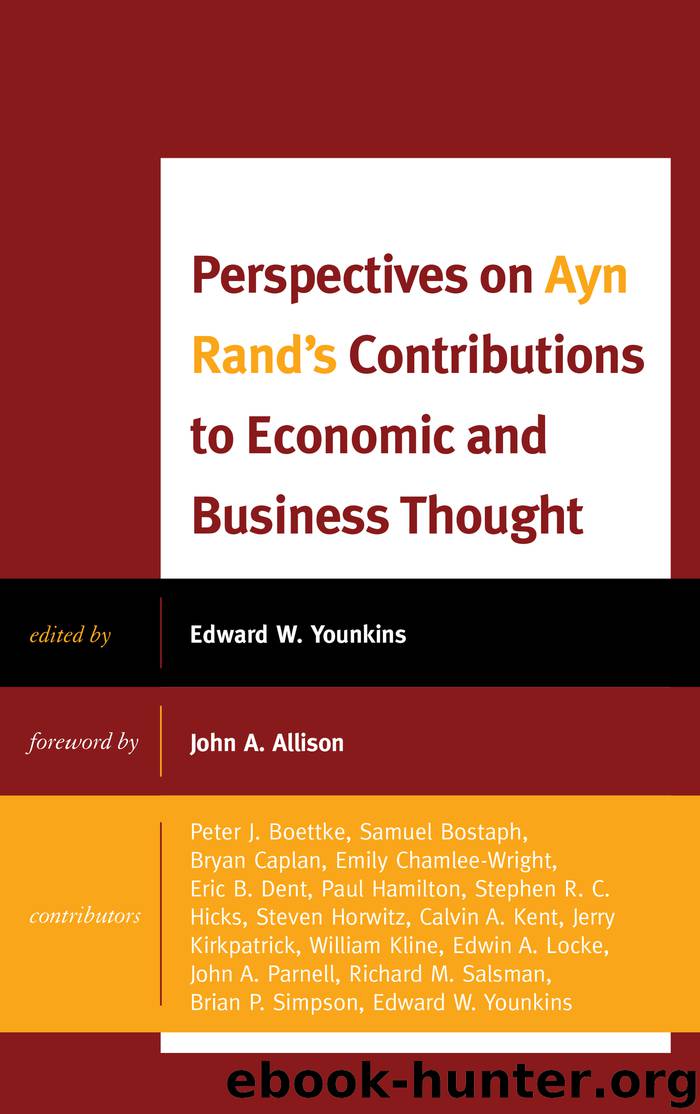Perspectives on Ayn Rand's Contributions to Economic and Business Thought by Ed Younkins

Author:Ed Younkins
Language: eng
Format: epub
Tags: undefined
Publisher: Lexington Books, a division of Rowman & Littlefield Publishers, Inc.
Published: 2012-02-26T16:00:00+00:00
“Blood, Whips and Guns—or Dollars”
One of the most provocative sections of Francisco’s speech is the final paragraph, particularly the last three sentences: “When money ceases to be the tool by which men deal with one another, then men become the tools of men. Blood, whips and guns—or dollars. Take your choice—there is no other—and your time is running out” (1957: 391).
The imagery is powerful here (critics would say “hyperbolic”), but the underlying argument is a sound one. Unpacking the argument, we can note that there are, at bottom, three ways in which individuals can interact with each other: coercion, verbal persuasion, and exchange. Although the lines that divide each from the other are sometimes hazy, it seems unarguable that these are three distinct modes of human action.[7] If we want others to act in particular ways, we can either attempt to force them to do so, attempt to persuade them (verbally) to do so, or we can attempt to offer them something in exchange for them undertaking the action. If we wish to obtain a book from the person who possesses it, we can either club her over the head and steal it, try to talk her into giving it to us, or offer her money or some other good or service in exchange for it. The same would be true of actions that did not involve the movement of physical goods. Other options for human interaction in such situations seem nonexistent.
To see Rand’s point, we need to understand why Francisco’s conclusion excludes (verbal) persuasion as one of the options. As early as The Wealth of Nations, Adam Smith (1976 [1776]) understood the reasons why exchange would come to dominate persuasion. In the beginning of the book, he notes that humans, like other animals, generally try to “fawn upon” others in order to get them to do what we wish. Through various forms of persuasion or sycophancy, we might try to get others to do what we would like them to. In addition, sometimes we might attempt to get to know a person well enough to be able to determine what he or she wants and provide it in an act of pure altruism. Conversely, we might try to let others know us well enough so that they will act with accurate altruism toward us. What Smith notes is that all of these strategies are limited when we move into the world beyond our close friends and family.
The world of what Hayek (1973) called “The Great Society” is a world of anonymity. The vast majority of the people we interact with, and in some sense must interact with, are people we know very little about. Smith understood this over 200 years ago when he wrote:
In civilized society [man] stands at all times in need of the co-operation and assistance of great multitudes, while his whole life is scarce sufficient to gain the friendship of a few persons. . . . But man has almost constant occasion for the help of his brethren, and it is in vain for him to expect it from their benevolence only.
Download
This site does not store any files on its server. We only index and link to content provided by other sites. Please contact the content providers to delete copyright contents if any and email us, we'll remove relevant links or contents immediately.
4 3 2 1: A Novel by Paul Auster(12377)
The handmaid's tale by Margaret Atwood(7757)
Giovanni's Room by James Baldwin(7330)
Asking the Right Questions: A Guide to Critical Thinking by M. Neil Browne & Stuart M. Keeley(5762)
Big Magic: Creative Living Beyond Fear by Elizabeth Gilbert(5756)
Ego Is the Enemy by Ryan Holiday(5415)
The Body: A Guide for Occupants by Bill Bryson(5082)
On Writing A Memoir of the Craft by Stephen King(4936)
Ken Follett - World without end by Ken Follett(4723)
Adulting by Kelly Williams Brown(4566)
Bluets by Maggie Nelson(4548)
Eat That Frog! by Brian Tracy(4526)
Guilty Pleasures by Laurell K Hamilton(4440)
The Poetry of Pablo Neruda by Pablo Neruda(4098)
Alive: The Story of the Andes Survivors by Piers Paul Read(4023)
White Noise - A Novel by Don DeLillo(4006)
Fingerprints of the Gods by Graham Hancock(3996)
The Book of Joy by Dalai Lama(3976)
The Bookshop by Penelope Fitzgerald(3844)
